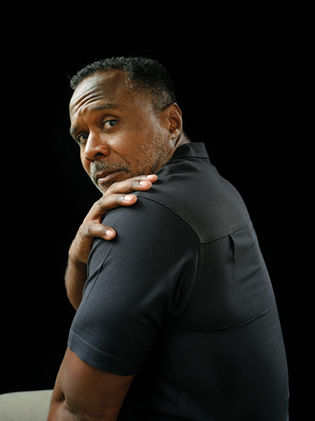
Chris Buck
James Hannaham ’90 has worked as a journalist. And as a composer. And as an
artist. And in theater. And he writes books. “I just did things,” says Hannaham.
View full image
James Hannaham’s website says it all, with a flourish: WriterProfessorCritic-PerformerVisualArtistWeirdo. That lack of spaces reflects his fluidly interdisciplinary approach to life. Hannaham ’90 has filled a gallery space with visual artworks that rely heavily on text, and his books are inflected both by the energy of a theatrical act and playful engagement with the language of academia.
His latest novel, Didn’t Nobody Give a Shit What Happened to Carlotta, tells the story of a Black trans woman returning home from prison to find Brooklyn unfathomably transformed from how it was when she left it. Esquire, Slate, and the New York Times all hailed it as one of the best books of 2022.
Brin Solomon: Thank you for making the time to talk.
James Hannaham: Absolutely! I’ve done profiles like this early in my career as a journalist, so it’s fun to be on the other end of the questions.
BS: Was journalism how you got into writing?
JH: I actually started out wanting to be a composer; I liked composing quite a bit, but I never really found a place where I thought people responded to it well. Going in the direction of concert music felt like a dead end—it was too esoteric and annoying.
BS: And now you write novels that make extended riffs on Ulysses?
JH: Well, Ulysses is the most mainstream esoteric thing there is.
BS: Was the relationship with Ulysses part of Carlotta from the start?
JH: Not at first. Everything with that book was a snowball effect—it started with a small idea. I’ve had a long family history with Fort Greene; I’ve watched it go from this dangerous Black neighborhood to not just this mostly white affluent neighborhood but also the literary capital of the United States.
So I wanted to write about that, and then all these other things started to come into play: what if there’s a character who missed the transformation of Brooklyn? What if they had missed it because they were in prison? And coming back from that would be sort of recreating the Odyssey, and that’s where James Joyce started to come in. Then this voice came to me, a voice I knew from gay clubs in the ’90s, and then I was up and running.
BS: You were doing some performing yourself in the ’90s, right?
JH: Yeah, that was around the time I was part of the core that formed the Elevator Repair Service theater company—it’s really a kind of bizarre parade of associations with various people.
BS: How has that experience with composing and performing shaped your path as a writer?
JH: “My path”—that makes it sound so intentional. There have been very few times in my life where I said, “I’m going to do this now so that then I can do that down the line.” I did go to graduate school so I could teach and write a book, but other than that, really, I just did things. I am, as a friend of mine likes to say, allergic to boredom. If it’s a path, it’s a forking path.
BS: Did Yale set you up for navigating those forks?
JH: You know, I was actually having a conversation with an editor recently about what an odd cauldron of ideas Yale was. Even if you didn’t study literature at Yale, it was still the epicenter of Deconstructionism and Post-Structuralism. Even if you didn’t take any of these classes, the ideas were still moving through the student body. It became part of how people related to each other. It was such a fruitful time for thinking about gender and LGBTQ questions and literature and criticism and art. Even though a third of my class applied to work at banks after graduating, I found the freaks.
BS: You found the freaks?
JH: I found the freaks, and I’m still friends with a lot of them that I loved then.
 loading
loading